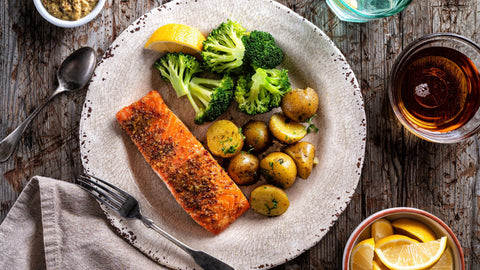The arrival of warm weather means one thing for many cooking enthusiasts: the start of BBQ season! What could be better than getting together with loved ones around a barbecue, enjoying juicy grilled meats and delicately cooked fish? But before diving into this long-awaited season, it is crucial to prepare properly. We'll give you a comprehensive guide to a successful BBQ season, covering everything from preparing your cooking space, to maintaining your equipment, to choosing the right tools and cooking oils.
Clean your BBQ like a pro
A well-maintained barbecue allows for successful grilling and extends the life of your equipment. Here is a step-by-step guide to deep cleaning your grill that you can do at the start of each season:
1. Clean the burner and gas pipes
• Burner maintenance should be performed at the beginning and end of the season.
• Turn off the barbecue and disconnect the gas supply source. Remove the cooking grates and heating plates to access the burner and gas pipes.
• Use a stainless steel brush to clean the burners and gas pipes, removing any grease or charred food residue.
• If necessary, disassemble the burners and pipes for further cleaning. Use warm, soapy water to remove stubborn dirt.
2. Wash the inside of the barbecue
After cleaning the burners, focus on the inside of the grill to remove grease residue and food debris.
• Use a long-handled barbecue grill brush and stiff bristles to scrape the inside of the barbecue with hot, soapy water.
• A barbecue grill cleaner can be helpful in removing particularly stubborn grease stains.
3. Burn fat from briquettes
To remove grease buildup on briquettes, perform combustion cleaning:
• Turn the briquettes over to expose the bottom surface.
• Close the barbecue lid and heat at high temperature for approximately 15 minutes.
• The heat will burn off grease and residue, leaving the briquettes clean and ready for the next use.
4. Clean the grills
After cleaning the briquettes, be sure to close the burners and allow the barbecue to cool.
• Remove cooking grates and use a long-handled, stiff-bristled barbecue grill brush or barbecue scraper. Use a stainless steel brush or spatula to remove burnt residue and encrusted grease.
• Once cleaned, make sure to dry the grills well with a cloth before putting them back in the barbecue.
• For added protection against rust and to maintain their quality, apply a thin coat of vegetable oil after cleaning.
*It is recommended to perform regular maintenance on the grills to prevent the accumulation of food and bacteria, while protecting them against corrosion.
5. Clean the exterior of the barbecue
To keep your barbecue in good aesthetic condition, clean the exterior of the barbecue as well.
• Use warm, soapy water to clean exterior stainless steel, enameled, powder-coated or painted surfaces.
• For stainless steel surfaces, wipe with the grain to avoid scratching.
6. Check and maintain the supply pipe
Check your grill's supply hose regularly for potential leaks and wear.
• Apply a mixture of soap and water to the joints to check for bubbles, which would indicate a gas leak.
• Wash the supply hose frequently to remove all traces of food.
7. Keep propane tanks in good condition
If you are using a propane gas grill, monitor the condition of your tanks to ensure safe use.
• Check cylinders regularly for signs of rust, dents or leaks.
• Exchange damaged or over 10 year old cylinders for new ones to avoid any risk of explosion.
By following these comprehensive cleaning steps, you will extend the life of your barbecue and achieve optimal cooking results every time.
For effective recurring cleaning without toxic products, follow these steps:
1. Heat the barbecue for a few minutes to soften food residue.
2. Use a stainless steel brush to scrape residue from the grill, avoiding metal brushes which can leave strings*.
3. Clean the inside of the barbecue with a mixture of hot water and white vinegar, then rinse thoroughly.
*Metal brushes remain the most popular products, despite the existence of wooden brushes and other alternatives for cleaning barbecue grills. To prevent the filaments from coming loose, he recommends replacing these brushes every two to three years and not scrubbing the grills too hard while cleaning.
The essential tools for successful grilling
For perfect grilling, equip yourself with the appropriate tools:
• A small baking tray for fish and delicate vegetables.
• Quality spatulas and tongs to turn your food without damaging it.
• A good stainless steel brush to clean the grill safely.
• A cooking thermometer for precise temperature control.
• Don't forget quality knives, a basting knife and a spray bottle for impeccable grilling.
The right oils to use to cook your meat and fish
The choice of cooking oil is essential for obtaining tasty and well-cooked grilled food. Opt for oils high in monounsaturated fatty acids such as extra virgin olive oil or avocado oil. Not only do they withstand high temperatures better, but they also add delicious flavor to your food. Avoid seed-based oils, as they can release harmful compounds when heated to high temperatures. Make sure you choose quality oils for optimal results.
To season your barbecue before you start cooking, use a neutral oil like grapeseed or avocado oil. Apply a thin layer to the grates using a cloth or brush to prevent food from sticking to them during cooking. This step is essential to prevent food adhesion and facilitate subsequent cleaning.
In short, by preparing your cooking space, choosing the right cooking oils and equipping yourself with the appropriate tools, you will be ready to fully enjoy the BBQ season. Don't forget to clean your barbecue regularly for tasty and safe grilling. Enjoy your food !






Comments (0)
There are no comments for this article. Be the first to leave a message !